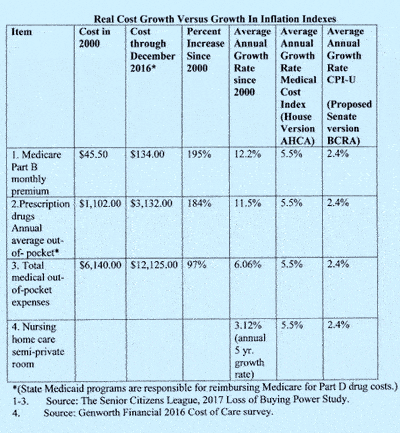Senate Health Bill Buries Biggest Medicaid Cuts Using Insufficient Inflation Adjustment
Author: The Senior Citizens League
Published: 2017/06/29
Category Topic: Seniors News - Related Publications
Page Content: Synopsis - Introduction - Main
Synopsis: The U.S. Senate health care repeal and replace bill, contains significantly deeper Medicaid cuts than those in the House bill.
Introduction
The Senate's health care repeal and replace bill, contains significantly deeper Medicaid cuts than those in the House bill, according to a new analysis by The Senior Citizens League (TSCL). "Writers of the legislation have crafted a bill that hides the fullest impact of deep cuts affecting low-income families, older and disabled Americans," says TSCL policy analyst Mary Johnson.
Main Content
Both the House and Senate GOP health bills go beyond repealing the Medicaid expansion under the Affordable Care Act, by ending the current Medicaid reimbursement system. Since Medicaid's inception, the federal government has matched state Medicaid expenditures for people whose income is low enough to qualify. Under the Senate and House health reform bills, the federal government would use a new formula to determine a payment for each person in the program. The payments would grow by a fixed amount thereafter indexed to inflation, and states would be on the hook for any gap in costs that grow faster than payments.

"Like the Social Security cost-of-living adjustment, the ability of those state payments to keep up with growing health care costs is crucial," says Johnson, who studies the gap between inflation and health care costs. If the inflation index doesn't, payments will be less and less sufficient to cover costs. Growing gaps between costs and reimbursements would force states to choose between cutting benefits, increasing state taxes, and restricting eligibility for benefits.
"This could be particularly problematic for older and disabled, low - income Americans who represent a disproportionate share of Medicaid spending," Johnson notes. About 11 million older Americans and people with disabilities have incomes low enough to receive help from Medicaid. Medicaid pays Medicare premiums or premiums and cost -sharing for those who qualify. Sixty-four percent of all nursing home patients receive their coverage through Medicaid.
The Senate bill stipulates an inflation adjustment measure that is growing at less than half the rate of the inflation measure stipulated in the House bill," Johnson explains. "Yet real health care costs, particularly for older Americans, are growing several times faster than either measure," she says. "Because the change would not start until 2025, we would not be getting complete information about the scope and depth of Medicaid cuts because the effective date of the provision falls mostly outside the ten - year window that the Congressional Budget Office will most likely use to score this bill (2018 - 2027)", Johnson warns.
The following chart illustrates the difference between the growth rates of typical Medicaid costs and the growth rate of consumer price indexes.
"Capping and adjusting payments to states using these consumer price index measures would take benefits away from millions of low - income families, including disabled and older Americans in nursing homes, all to pay for massive tax breaks for the very wealthiest U.S. households," Johnson says. "This bill hides the true cost from the public and threatens access to care." The Senior Citizens League opposes the new health care legislation and urges the public to contact lawmakers.